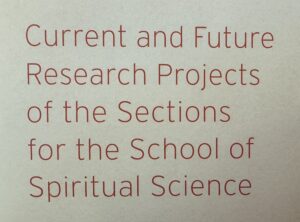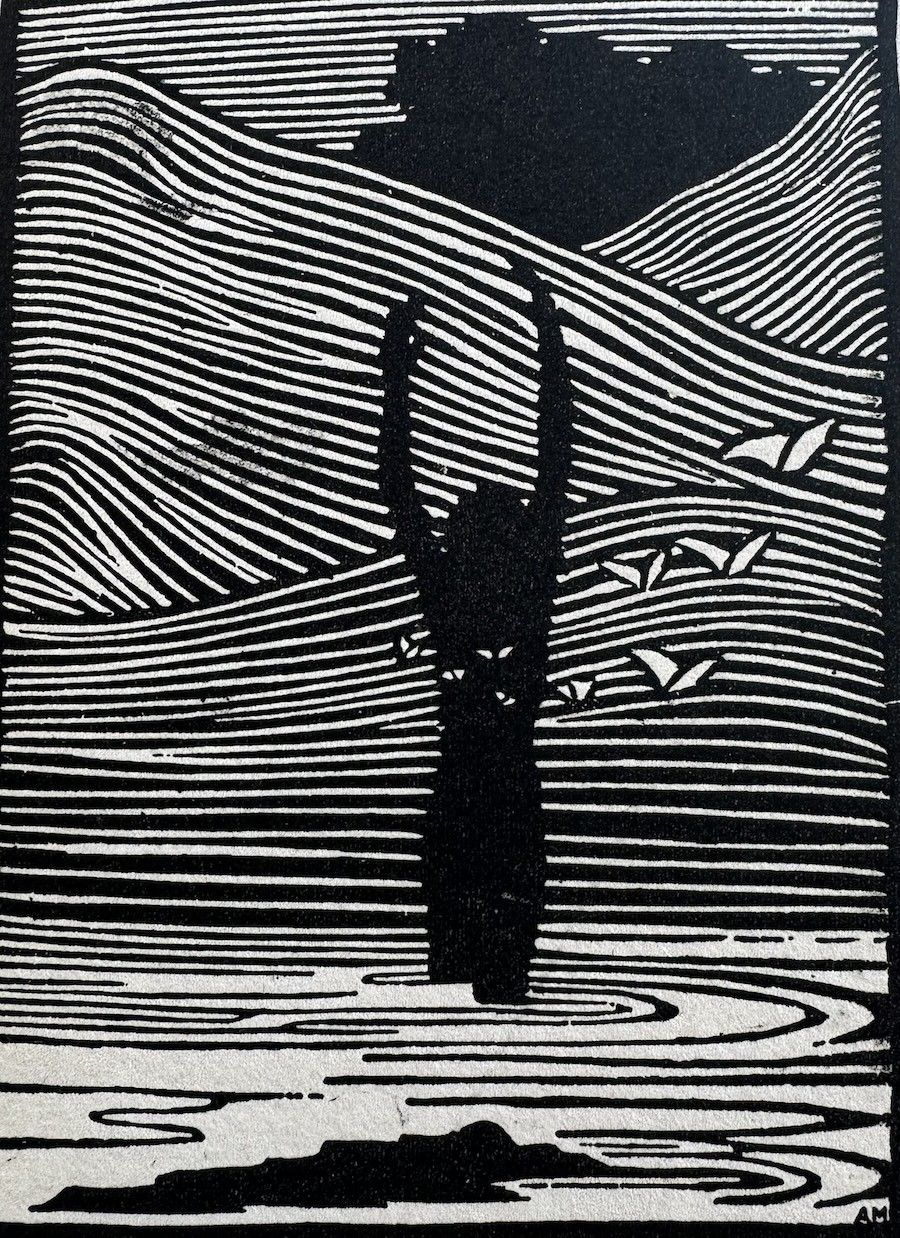Woodcut by Arvia MacKaye Ege
As a university department in the School for Spiritual Science, the Section for the Literary Arts and Humanities (Schöne Wissenschaften, as the name appears in German) sponsors a variety of research initiatives that focus on core questions and methodologies of the School.
These research initiatives originate from the work and meetings of the Section at the Goetheanum, although inspiration for an initiative might arise from any of the Section groups throughout the world.
The North American Section has a special interest in this particular research topic, and this North American interest will find reflection in the North American Section Conference planned for 2024.

Literature as a Path to Being Human
Encountering Self and Fostering Community
Research Question and Background
Editor’s Note: This Research Project Report is one of many that appear on the Goetheanum website for the Section and in the publication of other Research Projects sponsored by the School.
Click here to view this document on the Goetheanum website.
======
Literature does not change the world, but it can alter our relationship to the world.
Literature allows us to enter other minds and other landscapes and to adopt fresh outlooks. It is a conversation with earth, sky, and other individuals – persons dead and persons living. Literature is a remembrance of times past, while at the same time it holds a mirror to the present and provides glimpses of the future. In this way, literature encourages complex thinking; it fosters empathy and enables us to evaluate the merits of our actions through understanding how others have acted.
The world presented by language – be it by novels, stories, or poems – arises from the formative powers of language.
At the heart of every writing attempt lives this question as an open secret: How does idea become reality through narration? If, as readers, we shift our attention from the What to the How – to the hammer and sparks of word-smithing – “how is it done?” – then we can better comprehend this creative process.
The word, as formative power, has spiritual affinity with those creative powers from which the world has its origin – and the reader and the writer share in this formative power.
Works of world literature from the Middle Ages to the present time are used as examples to show how literature variously inspires and stimulates these creative, formative powers in the human being.
Relevance and perspective
“Creative word” is a term that today inspires scant comprehension. Language and words are used primarily to provide information, and even this model of language is being displaced by the increasing popularity of “picture language.” ChatGPT and computer-generated speech threaten to subvert ideas of authorship, and the human being, as creator, becomes superfluous from this perspective.
These recent technological developments push to the forefront a question: Does the human being play an essential, creative role as shaper of language and literature? Recognition of this essentialist question is decisive for the future. Literature provides us a means to practice skills needed to recognize the essential meaning of human authorship.
Procedure and research status of the project
Based on literary studies and Rudolf Steiner’s spiritual research, we have developed a methodology that makes it possible to understand the extent to which literature has a humanizing influence. This helps to pave the way for an encounter with what is essentially human, and it ultimately enables persons to reconnect with the spiritual world.
A four-step methodology arises, based on anthroposophical pedagogy.
Step 1: Read to understand the literal meaning of the text.
Step 2: Read to comprehend the imaginal aspects of the text. This corresponds to the level of cognition that has the name Imagination in anthroposophy.
Step 3: Read to transform the imaginal content of the text through an infinitely re-iterative lemniscate of inversion and re-creation known as Inspiration.
Step 4: Read to encounter the origins of the text: the essential source-springs from which the text arises and has life. This is equivalent to Intuition, and here the reader stands as a creative equal with the author.
Of course, this methodology cannot be applied across the board equally to all texts, and we demonstrate this fact through the analysis of various texts. The individuality of the author and the individuality of the text determine how each text is to be approached. A case-by-case methodology is required.
The “significance of literature for the human being” is a topic currently under discussion in the neurosciences. This includes research domains such as salutogenesis, reading research, ethics, and philosophy. Accordingly, we also refer to such topical research. This is followed by a brief overview of the meaning of the Word from antiquity to present day, a chapter on Rudolf Steiner’s understanding of language in relation to our research question, and an analysis of various texts.
The following texts have been examined as examples:
- Goethe: Conversations of German Refugees (which contains as its final chapter The Fairy Tale (of the Green Snake and Beautiful Lily) – a fairytale that Rudolf Steiner identified as having inspired the “germinal seed” of the anthroposophical movement.
- Goethe: Wilhelm Meister’s Apprenticeship
- Adalbert Stifter: “Heavenly slownesses” — Healing rhythms and irritating disturbances. “One speaks of the “heavenly lengths” of Beethoven – and one could also speak of the “heavenly slownesses” of Adalbert Stifter. The slowness of the quiet and gentle procession of his things, landscapes, heroes: as if they were returning, reappearing after a very, very long oblivion.” Peter Handke, Langsam im Schatten, 1992.
- Franz Kafka: The Metamorphosis
- Christian Morgenstern: “I stand behind the stars.” The conversation between human being and cosmos.
- Rose Ausländer: “Return to the Lost Word”
- Patrick Roth: Sunrise: The Book of Joseph
These texts are in progress:
- Joseph von Eichendorff: “It was like an eternal Sunday in my mind” from Memoirs of a Good-for-nothing (1826)
- Parzival (Wolfram von Eschenbach)
- Novalis: Various works.
The overview chapter is still a work in progress, as are analyses of texts by Hölderlin and Marica Bodrožic.
[Novelist Marica Bodrožic is one of the presenters at the upcoming 2026 Novalis Conference in Dornach.]

Listing of Section Research Projects at the Goetheanum
(Translated from the German by Bruce Donehower,)
2.2.24

